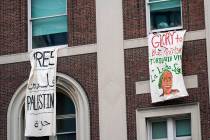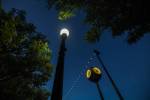LETTERS: Utility-scale solar no replacement for rooftop
I would like to respond to Richard Schmalensee's rooftop solar hit piece ("It's time to supersize," Jan. 17 Review-Journal). Mr. Schmalensee's premise is that money invested in solar power is more wisely spent on utility-scale solar systems, rather than residential rooftop solar. He states residential solar continues to grow robustly, in large part because it is heavily subsidized when compared with utility-scale solar.
We have a fine example of some clever utility-scale federal subsidization right here in our own backyard. That would be the bird-scorching boondoggle outside of Primm called Ivanpah, which was designed to produce enough power to service 140,000 homes, but alas has proven only half that effective. Yet this project was awarded a $1.6 billion loan guarantee from the Department of Energy. A quick calculation would reveal that amounts to $22,857 per home serviced. Rooftop solar customers receive a 30 percent income tax credit after first spending the dollars and having their systems installed. That subsidy averages slightly less than $8,000 per customer.
The Ivanpah facility also must use natural gas to preheat water before its solar system can take over. How much natural gas? More than would be used by a natural gas plant producing an equal amount of power. That's clean energy? For those unfamiliar with rooftop systems, there is no preheating or fossil fuel usage, and no emissions involved.
Mr. Schmalensee concludes by stating the ultimate goal should be to treat all solar generators equally and to reform net metering and other policies that unnecessarily raise power rates for everyone. In view of facts mentioned above, who is being treated fairly? Perhaps Mr. Schmalensee could explain why NV Energy contracted to buy power from the new solar plant in Tonapah for 13.5 cents per kilowatt hour, while the latest decision by the Public Utilities Commission will ultimately provide less than 3 cents per kWh for rooftop solar generators.
Again, who is being treated fairly? I don't know why Gov. Brian Sandoval, through his handpicked PUC, is trying to destroy the rooftop solar industry, or why the Review-Journal is aiding and abetting him in doing so. My best guess is that both are in bed with Big Energy.
Tom Koski
Las Vegas
Laying solar to rest
It is about time to lay the solar net metering argument to rest. I don't think anyone really cares, except for those who got taken for a ride by the solar industry. The majority of us don't have solar, nor are we really thinking of installing it. Rooftop solar owners can probably file suit against the solar installation companies and get them for fraud, as they not only collected money from customers, but also from the government.
The solar industry will not survive without subsidies from the government, because costs are too high for the average American. There are a lot of other good deals around, like oceanfront property in Arizona.
Dave Mesker
Las Vegas
ESA program
Robert Enlow is disingenuous in his commentary supporting ESAs ("Parents deserve options, not delays on ESA program," Jan. 21 Review-Journal). He paints the picture of a widow living on Social Security and trying to support the educational needs of three children, now suffering the financial burden of having any ESA financial support in suspension.
Of course, there is sympathy for any widow trying to get by financially with three small children. But to try to use this picture in support of ESAs is false. Mr. Enlow gives us no reason to believe the plight of this family is the result of lack of ESA money. There is no reason to believe the family's needs could not have been met within the public school system, for education, counseling and mentoring.
Can a family obtain ESA funds for Mr. Enlow's list of tutoring, online education, special needs therapy, fees for SAT/ACT exams and books without dropping out of public education? The answer is no. ESA monies are only for those students entering private education, period. As such, ESAs are a means of using public money for private schools, including religious-run schools.
Those who support this program should have known it would be constitutionally challenged, and it is they who placed the widow and three children in this financial mess, promising things they could not deliver. If Mr. Enlow really has concerns for the widow in question, he can simply write her a check for $5,000 for the current school year. Problem solved.
Richard L. Strickland
North Las Vegas























